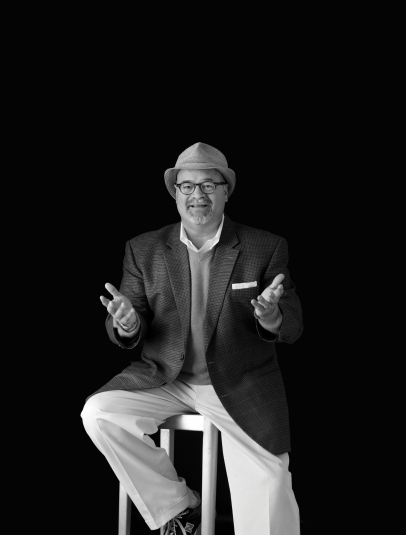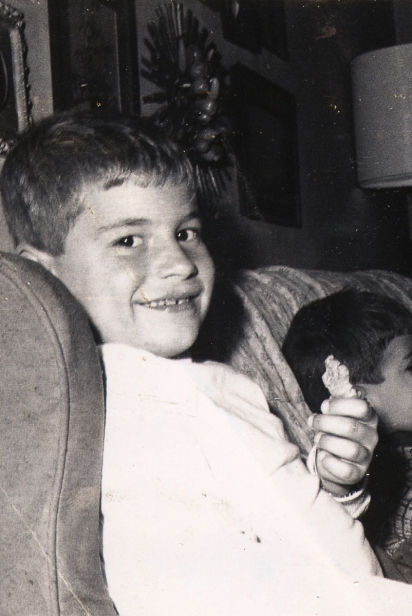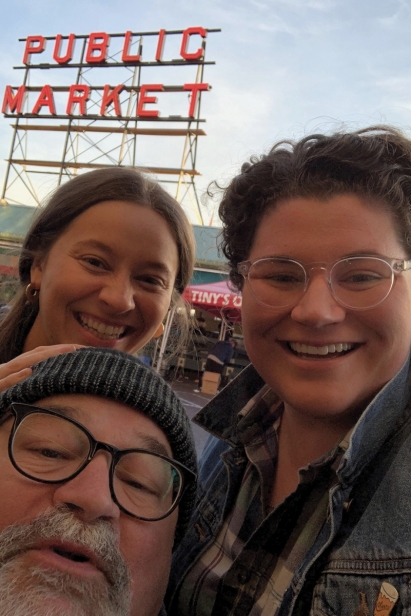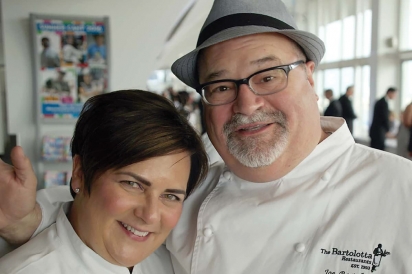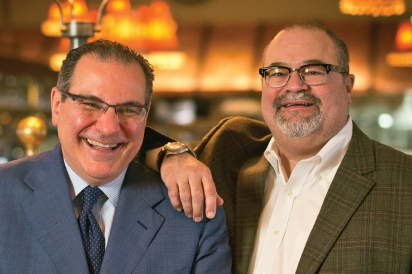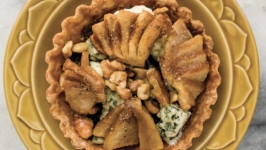"Life is a Banquet"
“Life is a Banquet” By May Klisch
A Chinese proverb says that when a tiger dies, it leaves behind its magnificent hide; but when a man leaves the earth, his legacy is his reputation. Nothing could be more evident than in the legacy of Milwaukee restaurateur Joe Bartolotta, one of our city’s most beloved personalities, who journeyed on in April of 2019.
His untimely death at just 60 years of age was a seismic event for Milwaukee’s restaurant and hospitality world. Two thousand people—employees, friends, patrons, partners in business and fans—filed into the Riverside Theater at the celebration of life last spring to pay their final respects to this pillar of hospitality.
Many wondered how the Bartolotta family and business would weather this major change, as Joe left a vacuum that everyone felt would be impossible to fill. What is to come for an organization whose late leader was so intrinsically tied to its vision and brand? Take heart: in recent conversations with Bartolotta family members, the road forward has always been charted for sustainability.
“From the start, the company was built on the premise that it would always be bigger than any one individual,” said brother and co-owner Paul Bartolotta. Bartolotta’s executive team has coalesced to solidify their charge, revisiting their original strategic plan. The “five tenets” that guided the Bartolotta team from inception remains ever more intact: caring first for employees, then clients, partners, vendors, the community and lastly, the bottom line. This “inverted pyramid” has allowed the Bartolotta group to grow to 17 facilities and 1,000 plus employees.
“We are forever in the talent acquisition mode,” says Paul, consistently “building the bench” to keep the talent deep. Paul knows that one of his responsibilities, in addition to trying to take care of Joe’s family, is to reintroduce himself as the corporate “face” of the Bartolotta brand. He had previously explored his own culinary journey with other global organizations, gathering experience which he integrated back into the Bartolotta Restaurant Group. However, Paul emphasizes the individual chefs are still the pure artistic talent of the Bartolotta brand. In spite of his own major culinary successes, he feels strongly that his role is not to eclipse those talented chefs but rather to bring them even further to the forefront.
Beyond the company’s sustainability, what of the wellbeing of the family members and how they’re coping? The stories shared with candor and raw emotions by Paul and sister Maria Bartolotta and Joe’s widow Jennifer, paint the picture of a fun-loving, humble, compassionate visionary who was acutely aware of his limited time frame. He worked, lived and loved with sensitivity and empathy. “Life’s for living,” he would say. Both siblings and Jennifer willingly shared insights into the Joe they loved, and what they still miss about him.
Paul shared that Joe had a knack for gathering friends and fans wherever he went—from barber shops to high-level industry leader meetings—making genuine and meaningful connections in a short time. Everyone was an “”FOJ”—a “Friend of Joe.” Maria and Paul agreed that Joe embodied the best characteristics of their parents: the caring and nurturing side of their mother alongside the deep sense of right, wrong and values of their father. Though their family did not have a lot in their early years, they had an upbringing filled with culture, music, ballet and opera.
“Our family was always ready to share whatever little we had,” said Paul. “When our extended family and friends suffered setbacks, we were always asked to give up our rooms and beds to others who needed it more, often for long periods of time. On weekends, we would have large food gatherings and include whomever needed a little lift. Later, whenever Joe had a few bumps in the road—yes, he got fired a few times!—he would remind himself of the need to treat others with kindness and generosity.”
“He knew how to treat people because he knew what it felt like to be down and out,” said Maria. “When an employee didn’t work out, Joe would ask, ‘Who failed whom?’ Joe often recalled that he didn’t get the kind of nurturing in jobs that would’ve helped him to succeed.” In his own company, Joe made empathy and compassion a large part of the culture. “His greatest gift was the ability to make others feel good about themselves. This resonated in our business because he always sought the ‘sparkle’ (the best) in people,” said Maria.
The brothers were close confidantes, two very different personalities that Maria says, “made for a great vinaigrette.” Does Paul miss the friendly sibling arguing? “We’re not arguing, we’re Italian!” quipped Paul. Joe used to complain to Paul about how his award-winning chef brother’s meticulousness for culinary perfection often crept into his consciousness: “You’re in my head!” Now Paul says he’s the one who’s walking around with a question rattling around in his head: “What would Joe do?” “He was the yin to my yang,” said Paul. “Now Joe’s constantly in my ear! I have an enormous responsibility to him and to us to build on his legacy, and take care of his and our whole family.”
Maria misses seeing Joe everyday; his warmth and his smile. “He had a childlike personality. He was a little person in a big body—smart, with beautiful, redeeming qualities.”
“I miss his generosity of spirit,” adds Paul. “I was talking to my priest. He tells me I haven’t really grieved the loss of my brother. I know it. He would’ve been there for my family as brothers would—so I want to be able to take care of Jen, Katy (Joe’s ex-wife) and their daughters Anna and Mary. It’s what family does.”
Maria says that everyone in the company is grieving, “We are still in a state of transition. It’s still very emotional for the extended family. We miss Joe walking through the door every morning, announcing, ‘Joe’s here!’ But he would want us to move forward. Everyone experiences and processes changes, loss, grief and pain in different ways. We’ll take care of each other. And yes—it hasn’t really hit Paul quite yet. Each of us has to get the space we need day by day in our different reality and find our new normal.”
Paul acknowledges this. “I just have to do it in my own way, in my own time.”
Joe’s widow, Jennifer Bartolotta, is also trying to find her own way. “Joe was a realist and very upfront. On our first date, he let me know the odds based on his childhood diabetes and kidney ailment: ‘I won’t live past 60.’ There weren’t many conversations left unsaid between us. Many people never know that kind of love.” With that mutual understanding, “Every day with Joe was a good day.” Jennifer confessed she has never known grief like this. She got a tattoo on her wrist of a phrase in his handwriting to remind herself about what he loved about her. They were “perfectly matched” in every way—she was already used to a high-pressure work environment as the sales manager of a Fortune 500 corporation and he brought a calm to her. Conversely she understood his business was one where their personal lives would take a back seat. She never once asked when he would be home for dinner.
“I could distill Joe down to two concepts: he was kind and he was perpetually happy, like a big puppy dog.” She has come to appreciate those qualities even more since he left. “Nothing caused him not to be happy. He had an innate ability to shake things off and make them go away; an, “other-worldly-like ability to see and respond in a kind, loving way. He seemed to live by (Maya Angelou’s words): ‘People never forget how you make them feel.’ He had a way of connecting with people, yet he would’ve been flabbergasted at the outpouring of love when 2,000 people showed up at his celebration of life.”
Jennifer still “talks” and “jokes” with him, knowing that she hasn’t fully emerged from the grieving process. “He lives on in so many faces and places. It feels like he just left, but he’s not gone.” His enduring legacy is indelible, she said. People who worked for him over the last 20 years still come up to tell her how Joe helped them. Like his parents, Joe carried on the practice of taking in people who needed help. Yet, Jen still had to help him work on accepting compliments. “I can still hear Joe’s words about caring: ‘It’s done instinctively and not formally. Every bit of what we do with that in mind moves us toward the big picture.’”
In the last year Jennifer has gratefully accepted posthumous awards on Joe’s behalf, worked with innumerable worthwhile causes and the people who shepherd them, spoken to more than 5,000 people, read and filed hundreds of condolence cards that have filled a wine case twice over and worked with the team on transitioning the business.
“Last year was pretty much a blur to me. I’m working on finding coping mechanisms, celebrating when we can.” She also finds comfort in the small graces that alight upon her. For one, when she found Joe the morning he passed he had “the biggest smile.” Recently her brother Jamie and his wife Angela had a baby girl, whom they realized two weeks later was conceived the very same night Joe died. They named her Josey B after Joe, though Jennifer nicknamed her “Joey B.” “It’s like we got this gift from Joe. Joe received a kidney from Jamie in February of 2013 that gave him many more years, and it was as if Joe had found a way to give something special back to Jamie. I think that’s what he was smiling about.”
2020 will be a year of faith for Jennifer, exploring and following wherever that path leads her. She has been working on a book about Joe based on the premise that “nice guys finish first.” “His story is such a hopeful one. It deserves to be shared with those who want to know about Joe and how he succeeded in life.” She’s also going back on the speaking circuit. She credits her daily spiritual practice for helping her, with Joe forever a part of her life. As in the movie Auntie Mame, she believes that, “Life is a banquet.”
The Joe that Jennifer holds dear in her heart is the big kid, “who’s like the two-year-old in the sandbox of life.” “I knew he was never mine to have forever,” she acknowledges, but what they shared and what Joe gave to her and everyone will endure a lifetime and beyond.


